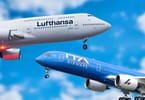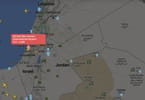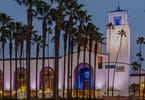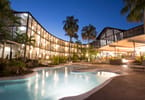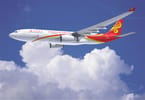Once again I have the opportunity to use my Rail Europe train tickets; my next destination is Frankfurt. This time I am traveling on ICE (InterCity Express) from Brussels, Belgium, to Frankfurt Am Main, Germany – and it only takes 3 hours.
An Alpha City
Frankfurt is Germany’s second largest metropolitan region and a major financial center in continental Europe. It is the center for national and international banking and finance resulting in high-end shopping, dining and hotel accommodations. The geographic center of the European Union is about 25 miles east of the City. Frankfurt has the world’s busiest international airport (by passenger traffic) in Germany, the third most active in Europe (after London Heathrow and Paris Charles de Gaulle) and comes in 11th as the most dynamic in the world. It is also the hub for Lufthansa (Germany’s flag carrier airline).
According to the Mercer Cost of Living Survey (2014) Frankfurt is the 59th most expensive city in the world (Hong Kong ranks #3; New York City ranks # 16) and the second most-costly city in Germany. Frankfurt is noted as being a “Green City,” with serious efforts made to reduce CO2 emission by 15 percent since 1990. In addition, it has the largest German city forest (one-third of the locale) and an extensive green belt. Commuters in Frankfurt frequently travel by bike (15 percent) and many chose to walk. ARCADIS (Amsterdam-based consulting firm) has identified Frankfurt as the number 1 sustainable city overall.
Time for MICE
Frankfurt has the third largest exhibition grounds in the world and it is known for its huge trade fairs; it hosts the world’s largest motor show, and the world’s principal book fair. The approximately 60,000 events scheduled each year attracts over 3 million visitors.
In May 2015 the best show in town will be IMEX – the focal point for 3,500 international hosted buyers (national and international tourist offices, major hotel groups, airlines, and trade associations) and 4,000 decision-makers from the German market.
Sleep. Eat. Like a Royal
Attending to business is not a choice. Meetings must be attended, speeches must be made and noted, forums and workshops require attention. There is little free-will. However, c-suite executives who have earned the right to make decisions (their careers depend on it) select the Kempinski Gravenbruch as their place to dine, sleep, hold private conversations and relax in an environment that is designed to be understated elegance.
Luxury Brand Origins
Although the Thailand Crown Property Bureau holds a majority position in the Kempinski AG organization since 2004, it was started in 1862 by the Jewish merchant Berthold Kempinski from Poland. He joined his brother Moritz who owned a wine store in Breslau, later moving to Berlin where the wine bar concept expanded to include an inexpensive gourmet restaurant. By the mid-19th century the Kempinski restaurant on Leipziger Strasse was the largest restaurant in the city. Kempinski Hotels were started in Berlin, Germany in 1897 making it Europe’s oldest luxury hotel group. Currently there are approximately 103 five-star hotels operating in about 36 countries.
The Kempinski Gravenbruch (Neu-Isenburg) just outside of Frankfurt, was previously owned by the Octavian Hotel Holding and recently acquired by the London-based retail and hotel investors -the Mashali family, an Anglo-Persian organization with decades of experience in the construction, retail and hospitality sectors.
Stefan Schwind, General Manager. Kempinski Gravenbruch Hotel, Frankfurt, Germany
Kempinski in Frankfurt
A hotel ambiance is created, developed and sustained by the General Manager. Walk into any hotel and in a few moments of close observation – it is easy to determine the personality and professionalism of the General Manager. In the case of the Gravenbruch, I just knew that the GM was a perfectionist and the staff and guests were in hands of a professional hotelier.
How did I know this? Guests are met at the airport and train station by a driver with a Maserati. No BMW or Mercedes for the Kempinski guest… it is the Maserati that keeps every sound (short of a heart beat) at bay and seamlessly brings guests to the front entrance of this grand hotel. The Maserati quickly transports guests through Frankfurt and into the countryside; within 15 minutes there is a break in the trees and a circular driveway appears. Not missing a beat, the driver stops at the entrance to the hotel (think of castles and palaces as the façade of this former hunting lodge is heritage-protected. A liveried staffer instantly takes the luggage from the “boot” and escorts guests to the Front Desk. Within seconds registration is completed and login passwords are entered into cell phones and laptops. A quick list of F&B options and c-suite executives are on their way to a suite that size of Nebraska.
The Gravenbruch is the reward for being successful. The public and private spaces are enormous! The interior design is traditionally comfortable – with a bit of a wave to contemporary. The picture-perfect view of the lake and woods from many suites are glorious as a winter scene backdrop and cherished for guests too busy to get out and about for leisurely walks through the gardens.
Stefan Schwind is the GM responsible for this corporate gem. He is the epitome of a c-suite executive who runs a hotel where the guests are treated as if they matter, and staff members are recognized for the important part they play in creating a perfect guest experience. The hotel industry shares my observations: In 2009 Schwind was voted one of the three best General Managers in the World at the 10th Worldwide Hospitality Awards ceremony and nominated again in 2011 for this important recognition.
For additional information, c click here.
This copyright article may not be reproduced without written permission from the author.
WHAT TO TAKE AWAY FROM THIS ARTICLE:
- In the case of the Gravenbruch, I just knew that the GM was a perfectionist and the staff and guests were in hands of a professional hotelier.
- Frankfurt has the world's busiest international airport (by passenger traffic) in Germany, the third most active in Europe (after London Heathrow and Paris Charles de Gaulle) and comes in 11th as the most dynamic in the world.
- The Kempinski Gravenbruch (Neu-Isenburg) just outside of Frankfurt, was previously owned by the Octavian Hotel Holding and recently acquired by the London-based retail and hotel investors -the Mashali family, an Anglo-Persian organization with decades of experience in the construction, retail and hospitality sectors.







